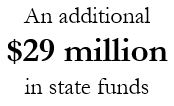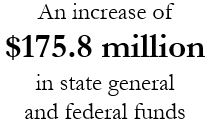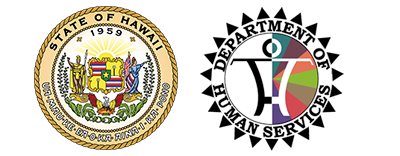DHS 2016 Legislative Roundup: Perpetual Motion
Posted on Jun 7, 2016 in Main, NEWS
By this time every year, the buzz at the Capitol has finally started to settle. Full halls of pacing feet, quiet discussions on wooden benches, and the tones signaling transitions from one hearing to another have subsided. Department of Human Services (DHS) team members spent innumerable hours in the Capitol over the 4 months of the 2016 legislative session. We celebrate the successes and hard work of our team and with fellow departments, legislators, and community groups on behalf of Hawai‘i’s people.
 During the 60 days of session, DHS and its attached agencies submitted an impressive 560 pieces of testimony. This effort translated into more than two-thirds of our administrative bills passing and heading to the governor to become law. The legislature passed six of the eleven – or 55% – of DHS administrative bills, two senate versions of the department’s administrative bills, and eight other departments’ administrative bills that impact DHS and DHS recipients.
During the 60 days of session, DHS and its attached agencies submitted an impressive 560 pieces of testimony. This effort translated into more than two-thirds of our administrative bills passing and heading to the governor to become law. The legislature passed six of the eleven – or 55% – of DHS administrative bills, two senate versions of the department’s administrative bills, and eight other departments’ administrative bills that impact DHS and DHS recipients.
In addition to administrative measures, our advocacy efforts resulted in an additional $29 million in state general funds allocated to our department. These state funds allow us leverage to access additional federal funds. In this second year of the biennium, the legislature approved an increase of $175.8 million in state general and federal funds to the department to serve Hawai‘i’s people in various ways. This increase brings the department’s FY 2017 budget to $3.3 billion.
 These successes may have been approved during the 60 days of legislative session, but the journey started long before session even begins.
These successes may have been approved during the 60 days of legislative session, but the journey started long before session even begins.
Year-Round Efforts
The Department of Human Services (DHS) team is actively involved in some part of the legislative process year-round. Work groups and committees discuss issues and devise potential solutions. Whether a legislative change is in response to a federal mandate, the result of litigation, new social or economic issues, or other improvement in best practices, a change in the law should be considered only when other avenues for improvement have been assessed and unintended consequences have been considered.
 In fall 2015, the director’s office, staff offices, and divisions began budget discussions and bill drafting and compiled the department’s annual reports to the legislature. Numerous bill and budget drafts are reviewed and revised until sometime in mid-January, when the directors and division administrators present the department’s bill package and budget requests to the governor and the Department of Budget and Finance. The executive bill package and budget is finessed and finalized in the weeks prior to the opening of the legislative session which convenes on the third Wednesday of each January.
In fall 2015, the director’s office, staff offices, and divisions began budget discussions and bill drafting and compiled the department’s annual reports to the legislature. Numerous bill and budget drafts are reviewed and revised until sometime in mid-January, when the directors and division administrators present the department’s bill package and budget requests to the governor and the Department of Budget and Finance. The executive bill package and budget is finessed and finalized in the weeks prior to the opening of the legislative session which convenes on the third Wednesday of each January.
During the 60 official days of the legislative session, the DHS legislative team vigorously advocates to preserve and expand needed programs and services for residents of Hawai‘i.  DHS also responds to legislative proposals that impact populations that DHS serves, as well as proposals that may impact government operations. DHS team members spent the 28th legislative session engaging legislators, other executive departments, the Judiciary, providers and constituents through dialogue, testimony and other discussion with remarkable success.
DHS also responds to legislative proposals that impact populations that DHS serves, as well as proposals that may impact government operations. DHS team members spent the 28th legislative session engaging legislators, other executive departments, the Judiciary, providers and constituents through dialogue, testimony and other discussion with remarkable success.
Our Vision for the 2016 28th Legislature of the State of Hawai‘i
Our department’s overall vision is to build a healthier Hawai‘i through a multi-generational, collaborative approach. With that goal in mind, our legislative efforts focused on four key priorities:
- Invest in children and families;
- Improve health and safety issues;
- Increase department capacity and efficiencies; and
- Improve systems.
These priorities align with the Governor’s policies of more effective, efficient, and open government, improved safety, health, education, and housing. These priorities illustrate the value and vital links between social capital, health and well-being, economic supports, education, and training and the importance of system improvement to maximize the efficient use of public funds.
Here are highlights of the 28th legislative session for DHS:
Invest in Children and Families
The department’s success depends on the success of the residents we serve. We use a whole-family, multi-generational approach to invest early and concurrently in children and families to improve health outcomes. Our 2016 administrative legislative bill package addressed the way we care for Hawai‘i’s children in foster care through supporting a child’s earlier involvement in case planning and decision-making, access to higher education for former foster youth, and resource caregivers’ ability to make reasonable parenting decisions. Our budget requests included continued access to child care, expanded services for individuals and families experiencing homelessness, and improved quality of life for individuals with disabilities. The following administrative bills and budget commitments successfully passed through the state legislature:
Child Care and Learning
- Background Checks for Child Care Providers: Keeps Hawai‘i’s children safer and healthier through background checks for licensed and registered child care homes and facilities, as well as license-exempt child care providers, which will bring the state into compliance with recent changes to federal law. HB2343 (BESSD)
- Preschool Open Doors: Increases preschool subsidies for 4-year-olds from $6 million to $10 million. (BESSD)
- A-Plus Program Subsidies: Supports continued afterschool A-Plus program participation for children in TANF/TAONF households with an additional $700,000 in A-Plus program subsidies. DHS supported this legislative bill. (BESSD)
- R.E.A.C.H. (Resources for Enrichment, Athletics, Culture and Health): Supports the R.E.A.C.H. initiative to provide an organizational framework for after-school programs for students in grades six through eight statewide with a non-recurring appropriation of $250,000. (OYS)
Foster Families and Former Foster Youth
- Former Foster Youth and Education: Extends the age former foster youth may apply for higher education assistance and clarifies who is eligible to receive that assistance. SB2878 (SSD)
- Resource Caregivers and Foster Youth: Brings Hawai‘i into compliance with recent changes to federal law by updating language and lowering the age of a foster youth’s involvement in their foster care plans; provides qualified immunity for resource caregivers (foster parents) to empower them to make reasonable and prudent parenting decisions to allow children in their care to participate in age and developmentally appropriate activities that support a child’s social and emotional development. HB2350 (SSD)
Homelessness
Allocates a one-time, non-recurring lump sum of $12M to the Department of Human Services to address homelessness. These resources will be deployed in alignment with the three levers of change outlined in the State’s Strategy on Homelessness:
- Affordable Housing (increasing the state’s inventory through new and existing units);
- Health and Human Services (connecting people to the support they need); and
- Public Safety (keeping public places safe, clear and accessible)
Improve Health and Safety
Hand-in-hand with investing in children and families is the department’s commitment to improving health and safety for Hawai‘i’s children and vulnerable adults. DHS believes that supporting health and well-being as a whole person underpins Hawai‘i residents’ success and quality of life. Our legislative package looked to achieve this by advocating for additional safeguards and leveraging access to federal funds. The following bills and budget requests passed the 2016 legislative session:
Community Development
- Equitable Transit Oriented Community Development: Names DHS Director and the Executive Director of Hawai‘i Public Housing Authority as members to the Hawai‘i Interagency Council for Transit-Oriented Development. Led by the Office of Planning, DHS and HPHA will support equitable transit-oriented development with the goals of maintaining and providing housing for low- or moderate-income families, preventing displacement of existing residents through gentrification, ensuring access to transportation by low- to moderate-income residents, and co-locating essential services for children and families. SB3077 (DIR/HPHA)
- Low-Income Housing Tax Credit: Improves the present value of the State Low Income Housing Tax Credits (LIHTC) that will support development of affordable rental housing projects. DHS supported this Department of Business & Economic Development & Tourism bill. SB2833 (BESSD/HPHA)
Children’s Health & Safety
- Criminal History Checks in Child Welfare Services (CWS) Cases: Allows CWS to better assess safety risks and develop service plans for children and its staff by allowing CWS access to criminal history information and records of individuals identified as alleged perpetrators and of all adults identified as household members. HB2340 (SSD)
- Child & Maternal Death Reviews: Reinstates child and maternal death reviews. DHS supported the Department of Health bill, which will conduct multi-disciplinary panels and review cases of child and maternal deaths to develop and implement prevention and intervention services. SB2317 (SSD/MQD)
Care for Elders
Adult Protective & Community Services Branch (APCSB) Orders for Immediate Protection: Clarifies that DHS may seek an order of immediate protection for elderly and vulnerable adults only when necessary, allowing APCSB to support a vulnerable adult’s and families’ ability to care for the adult rather than requiring the Family Court’s intervention in every case. SB2873 (SSD)
Access to Health Coverage and Benefits
- Hospital Sustainability and Nursing Facility Sustainability Programs: Extends the Hospital Sustainability and Nursing Facility Sustainability programs for another year to leverage federal funds for Hawai‘i’s hospitals and nursing facilities. SB2230 Hospital Sustainability (MQD); SB2213 Nursing Sustainability (MQD).
- Youth Access to Mental Health Care: Lowers the age of consent to mental health services to 14 years of age, which will allow greater access to services and early invention for youth. DHS supported the Department of Health’s bill, which will allow Hawai‘i’s children, 14 and older to seek and consent to mental health treatment (excluding treatment that requires a prescription or residential care) without the consent of their parent or guardian. SB1886 (MQD)
- Access to a 12-Month Supply of Contraceptives: Allows women to receive a 12-month supply of prescription contraceptives at one time to decrease the number of unplanned pregnancies in the state, impacting especially women who live in rural areas. DHS supported this legislative bill. SB2319 (MQD)
- Access to Opioid Antagonist: Reduces opioid-related overdoses by allowing individuals and first responders to possess and administer opioid antagonists to temporarily block the effects of prescription and illicit opioids in cases of overdose. DHS supported this legislative bill. SB2392 (MQD)
- Enhanced Access to Telehealth: Expands telehealth services by requiring Medicaid to provide reimbursement for services provided by telehealth in the same manner as those provided in person, which may improve disease management and access to health care services. DHS supported this legislative bill. SB2395 (MQD)
Homelessness
The previously mentioned $12 million allocation to address homelessness will also include measures that improve health and safety for homeless individuals and families. HB1700 CD1
Increase Departmental Capacity and Efficiencies
DHS has the largest operating budget of any state department—approximately $3.1 billion—has the fifth largest staff of any state department, and serves one in four Hawai‘i residents. During the 2016 legislative session, the following bills and budget requests passed, allowing the department to improve the coordination, compliance, and quality of programs. These measures will help build capacity within our team to work more efficiently and effectively for our clients.
- Exempt Positions in the DHS Director’s office and Med-QUEST division:
- Establishes a Community/Project Development Director and Policy Director positions, temporarily exempt from the Civil Service Law, in the Director’s Office to align and coordinate the programs of one of the state’s largest departments (by operating budget, federal funding, and staff). HB2353 (DIR)
- Establishes six positions temporarily exempt from the Civil Service Law that will allow the Med-QUEST Division to compete in recruiting, hiring, and retaining the best possible individuals to continue to provide quality health care coverage to Hawai‘i’s eligible residents. HB2353 (MQD)
- Medicaid Fraud: Changes the State’s fraud statute to allow for the prosecution of applicants and recipients of Medicaid benefits who knowingly provide a false statement to qualify for medical insurance coverage. DHS supported this Department of the Attorney General’s bill. HB900 (MQD)
- Vital Records: Allows the Department of Health to provide vital records information regarding death information to the Med-QUEST division to end benefits timely and avoid expenses related to the recoupment of benefits that result if benefits continue to be paid on behalf of a deceased person. DHS supported the Department of Budget & Finance’s bill. HB2311 (MQD)
- Appeals Office Position: Establishes a position in the Administrative Appeals Office with a $25,000 general fund request that will draw down $12,000 in federal funds. An additional employee will significantly improve the Administrative Appeals Office’s ability to comply with federal and state administrative law and program processes to 1) timely restore eligible benefits to individuals or 2) timely terminate benefits when individuals are no longer eligible to receive them. HB1700 (HMS 904)
Improve Systems
The fourth priority encompasses the first three. In prioritizing the safety and well-being of Hawai‘i’s children and families and increasing department capacity, DHS is investing in our overall systems. These systems will ultimately serve our workers and clients. Below is just one example of budget allocations that will help us improve our systems.
Health Data: Creates greater transparency in healthcare by requiring providers and all payers of claims for healthcare services to submit data to the State Health Planning & Development Agency. The required information allows the State of Hawaii to appropriate policy and fiscal decisions regarding healthcare costs. DHS supported this legislative bill. HB2482 (MQD)
 During the 60 days of session, DHS and its attached agencies submitted an impressive 560 pieces of testimony. This effort translated into more than two-thirds of our administrative bills passing and heading to the governor to become law. The legislature passed six of the eleven – or 55% – of DHS administrative bills, two senate versions of the department’s administrative bills, and eight other departments’ administrative bills that impact DHS and DHS recipients.
During the 60 days of session, DHS and its attached agencies submitted an impressive 560 pieces of testimony. This effort translated into more than two-thirds of our administrative bills passing and heading to the governor to become law. The legislature passed six of the eleven – or 55% – of DHS administrative bills, two senate versions of the department’s administrative bills, and eight other departments’ administrative bills that impact DHS and DHS recipients. These successes may have been approved during the 60 days of legislative session, but the journey started long before session even begins.
These successes may have been approved during the 60 days of legislative session, but the journey started long before session even begins. In fall 2015, the director’s office, staff offices, and divisions began budget discussions and bill drafting and compiled the department’s annual reports to the legislature. Numerous bill and budget drafts are reviewed and revised until sometime in mid-January, when the directors and division administrators present the department’s bill package and budget requests to the governor and the Department of Budget and Finance. The executive bill package and budget is finessed and finalized in the weeks prior to the opening of the legislative session which convenes on the third Wednesday of each January.
In fall 2015, the director’s office, staff offices, and divisions began budget discussions and bill drafting and compiled the department’s annual reports to the legislature. Numerous bill and budget drafts are reviewed and revised until sometime in mid-January, when the directors and division administrators present the department’s bill package and budget requests to the governor and the Department of Budget and Finance. The executive bill package and budget is finessed and finalized in the weeks prior to the opening of the legislative session which convenes on the third Wednesday of each January. DHS also responds to legislative proposals that impact populations that DHS serves, as well as proposals that may impact government operations. DHS team members spent the 28th legislative session engaging legislators, other executive departments, the Judiciary, providers and constituents through dialogue, testimony and other discussion with remarkable success.
DHS also responds to legislative proposals that impact populations that DHS serves, as well as proposals that may impact government operations. DHS team members spent the 28th legislative session engaging legislators, other executive departments, the Judiciary, providers and constituents through dialogue, testimony and other discussion with remarkable success.